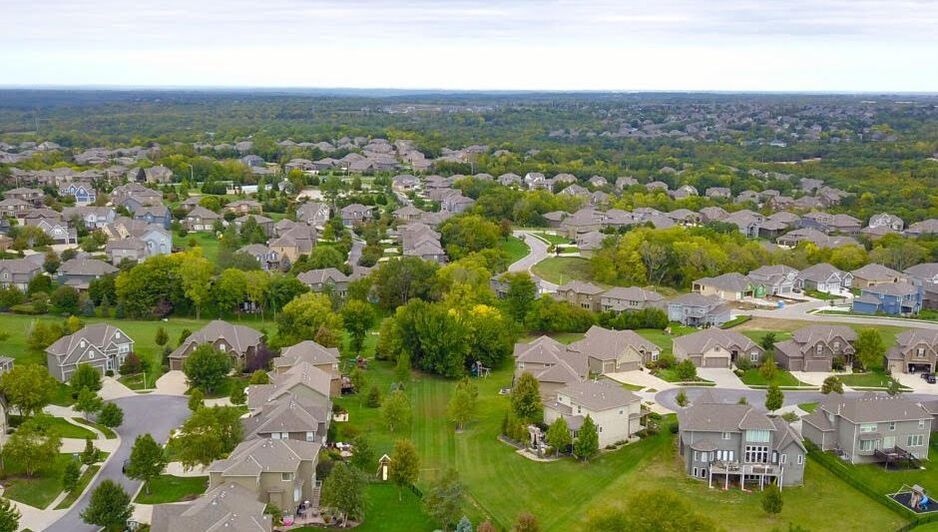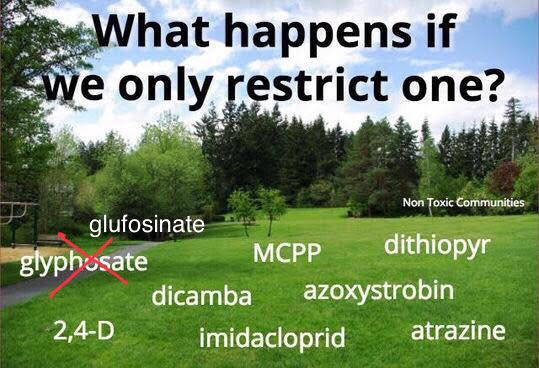|
When campaigning for safe city parks, playgrounds and athletic fields, we want to make sure our efforts are being directed toward achieving a long-term comprehensive solution. There are several reasons why focusing on one chemical, like glyphosate, isn't the best way forward. Toxic chemical whack-a-mole There are many real life examples of regrettable substitution when it comes to toxic chemicals. This is when one chemical is replaced by an equally problematic or even worse substitute. It is no different with pesticides like glyphosate. Some cities and HOAs have banned the herbicide, only to replace it with another synthetic herbicide like glufosinate, or diquat dibromide. This strategy fails to protect both public health and the environment. Other hazardous chemicals can be overlooked Glyphosate, the most widely used herbicide in the world first sold under the brand name Roundup, has received a lot of attention for several reasons. Most recently its classification as a probable human carcinogen by the International Agency for Research on Cancer (IARC) followed by tens of thousands of lawsuits against the manufacturer Monsanto, alleging that exposure to their product caused plaintiffs to develop non-Hodgkin lymphoma and that the company knew about the cancer risks and intentionally failed to warn consumers. Despite three juries finding on behalf of the plaintiffs, the link to cancer remains hotly contested and controversial. Sometime this debate overshadows the concerns of scientists over the effects of the chemical beyond just cancer. While the news about glyphosate has been most welcome in the sense that it has created a lot of public awareness, it is also something of a double edged sword. Ideally glyphosate should be held up as a case study of how the federal regulatory system is failing to ensure that public health and the environment are protected. Unfortunately, the reality is that the proportion of media reports, and even some less than robust scientific papers, have led to a disproportionate amount of attention on Roundup, while equally or more toxic chemicals continue to be used in large amounts in our landscapes with little scrutiny. Civil Eats reported that the organic yogurt company "Stonyfield commissioned a survey last year which showed that while 69 percent of American parents are looking to lessen exposure to pesticides in food, nearly the same number of parents (67 percent) do not consider sports fields, playgrounds, or parks to be of concern." So even with all of the news reports about glyphosate based herbicides, a significant number of people are still not really aware of what's being used in our landscapes. When it comes to turf grass areas like athletic fields, it's not Roundup being sprayed (because that would kill the grass) but "selective" herbicides like 2,4-D which is usually found in combination products like SpeedZone for instance, are typically used. Insecticides like imidacloprid, a neonicotinoid, and fungicides are also used. The use of these synthetic pesticides are at least as worrisome as the glyphosate being sprayed along fence lines, flowerbeds, and on hardscapes. Advocates can end up having to do the work all over again If we were only to ban one type of pesticide product at a time, we would not achieve what we are really looking for - landscaping practices that do not rely on any toxic pesticides. Organic landscaping helps protect the environment and public health because it is a comprehensive approach to landscape management, not simply a product for product swap. The focus shifts to organic inputs that improve soil health, and good cultural practices to manage weed and pest pressure. As advocates your time is valuable, and your hard work is best spent on a strategy that eliminates the use of all toxic pesticides, rather than just one. This is why we don't want you to ban glyphosate, but rather use your time and energy to run a campaign that brings in safe, reliable, organic solutions. To learn more about organic landscaping, visit the Organic Land Care Project. Check out our Tools for Change to get started with a pesticide reform campaign in your community. 12/30/2019 07:07:54 am
It's regrettable that any society has to depend on man-made chemicals wheather they be garden chemicals or pharmaceuticals. But if we must, we have to hope only the smartest and most caring of people develop these chemical entities. People, like myself, don't want any increased chance of any cancer occurring in anyone. All you have to do is look at the kids and families at St. Jude's. Their grief is not worth the increased chance. I will not buy Roundup anymore if there are safer alternatives. It's not ethical or moral to take the chance. Making money for a company is not a reason to take a chance. The word "man" is in the phrase "man-made" and everyone knows man is not perfect.
Jeanie K Keeny
12/30/2019 11:41:40 am
Why does this sound like whataboutism? 12/30/2019 12:03:23 pm
Hi Jeanie, We advocate for organic policies and ordinances that eliminate ALL toxic pesticides, including glyphosate based herbicides, to protect public health and the environment. Comments are closed.
|
Archives
March 2024
Categories |
|
Non Toxic Communities is a 501 (c) (3) charitable organization
Nontoxic Communities Foundation, Inc. dba Non Toxic Communities Copyright © 2024 Non Toxic Communities - All Rights Reserved Site design by Bee Rooted | About Us | Contact Us |


 RSS Feed
RSS Feed
